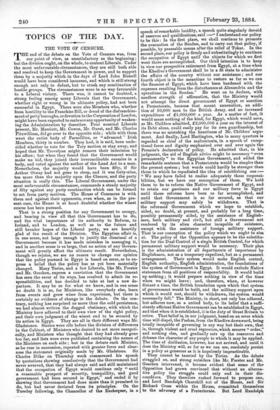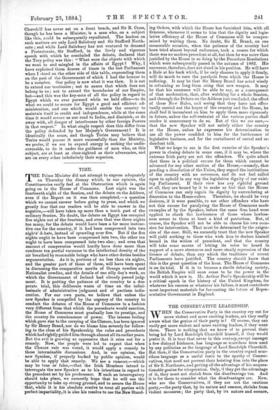TOPICS OF THE DAY.
THE VOTE OF CENSURE.
present, Mr. Marriott, Mr. Cowen, Mr. Guest, and Mr. Charles Fitzwilliam, did go over to the opposite side ; while with them went the entire body of Parnellites, or " advanced " Irish Members, thirty in number. They had, it is said, been unde- cided whether to vote for the Tory motion or stay away, and
hoped that Mr. Trevelyan might remove their indecision by his offers ; but when they found that the Government would make no bid, they joined their irreconcileable enemies in a body, and voted against the author of the Land Act to a man. Nevertheless, the majority would have been fifty, if Sir Arthur Otway had not gone to sleep, and it was forty-nine, ten more than the majority upon the Closure, and the party situation is really this. The Liberal Government, under the
most unfavourable circumstances, commands a steady majority of fifty against any party combination which can be formed to act from party motives. The House of Commons is with them and against their opponents, even when, as in the pre- sent case, the House is at heart doubtful whether the wisest course has been pursued.
That is a strong position for any Government to occupy, and bearing in view all that this Government has to do, and the vital importance of its authority to Reform, to Ireland, and to London, as well as to the future and still broader hopes of the Liberal party, we are heartily glad of the result of the Division. The Egyptian affair is, in one sense, not large enough to justify the dismissal of a Government because it has made mistakes in managing it, and in another sense is so large, that no action of any Govern- ment will greatly affect the ultimate result. Nevertheless, though we rejoice, we see no reason to change our opinion that the policy pursued in Egypt is based on error, or to ex- press a belief that the policy has as yet been materially changed. Many Tories, and a few Liberals, like Mr. Forster and Mr. Goschen, express a conviction that the Government has seen the error of its ways, has resolved to admit its re- sponsibilities, and has decided to take at last a new de- parture. It may be so for what we know, and in one sense no doubt it is so, for Ministers, like everybody else, learn from events and grow wiser from experience, but there is certainly no evidence of change in the debate. On the con- trary, nothing has surprised us more than the cold persistence, we had almost written the dogged obstinacy, with which the Ministry have adhered to their own view of the right policy, and their own judgment of the wisest end to be secured by its action in Egypt. They are all in their different ways Mr. Gladstones. Stories were rife before the division of differences in the Cabinet, of Ministers who desired to act more energeti- cally, and Ministers who thought that they had already gone too far, and lists were even published containing the names of the Ministers on each side ; but in the debate each Minister, as he rose in succession, repeated with greater force and clear- ness the statement originally made by Mr. Gladstone. Sir Charles Dilke on Thursday week commenced his speech by quotations showing conclusively that the Government had never swerved, that they had always said and still maintained that the occupation of Egypt would continue only "until a reasonable prospect of security, tranquillity, and good government had been secured in Egypt," and ended it by showing that Government had done more than it promised to do, but had never deviated from its principles. On the Tuesday following, the Chancellor of the Exchequer, in a
speech of remarkable lucidity, a speech quite singularly devoid of reserves and qualifications, said :—" I understand our policy to be this : In the first place, we shall continue to promote the evacuation of the Soudan and to carry out that policy, if possible, by peaceable means after the relief of Tokar. In the second place, our policy is firmly and unhesitatingly to continue the occupation of Egypt until the objects for which we first went there are accomplished. Our third intention is to keep in view our prospective retirement from Egypt, at a time when the Khedive's Government shall be in a fit state to administer the affairs of the country without our assistance; and our fourth object is in the meantime to restore as far as we can the finances of Egypt, which have been burdened with the expenses resulting from the disturbances at Alexandria and the operations in the Soudan." He went on to declare, with needless strength of affirmation, that the Ministry would not attempt the direct government of Egypt or sanction a Protectorate, because that meant annexation, an addi- tion of 10,000 men to the British Army, and an increased expenditure of £1,000,000 a year. As a matter of fact, it would mean nothing of the kind, for Egypt, which would save,. as Mr. Childers admitted, £2,000,000 a year on the interest of its Debt alone, could easily pay for its own guardianship, but there was no mistaking the heartiness of Mr. Childers' argu- ment. And finally, Lord Hartington, who in many quarters is regarded as chief of the malcontents, in a speech of excep- tional force and dignity emphasised over and over again the Premier's declaration of policy. He admitted that, in his judgment, the aid of English advice might be necessary "even permanently" to the Egyptian Government, and added the remarkable sentence that a Protectorate would be simpler than the present system ; but words could hardly be stronger than those in which he repudiated the idea of establishing one :- ' We may have failed to realise adequately these responsi- bilities, but we have our conception of them. We hold them to be to reform the Native Government of Egypt, and to retain our garrisons and our military force in Egypt until those reforms have been so far accomplished, and until that Government is so far secured, as that our military support may safely be withdrawn. That is the reformed Government which we hope to establish, aided, no doubt, at present, and probably for a long time,. possibly permanently aided, by the assistance of English- men, both military and civil, but still a Government not rendered by its alien character incapable of existence, except with the assistance of foreign military support. That is our conception of the policy which we ought to aim at. The policy of the Opposition appears to be the substitu- tion for the Dual Control of a single British Control, for which permanent military support would be necessary. Their plan is the administration of all departments of importance by Englishmen, not as a temporary expedient, but as a permanent arrangement. Their system would make English control, English authority, English administration, the foundations of the system of Government in Egypt. It would exclude Native statesmen from all positions of responsibility. It would build up nothing ; it would prepare nothing in view of the time when we might leave ; and, therefore, when, at however distant a time, the British foundation upon which that system. of government would be built, and the military support upon which it would rest, should be withdrawn, the system would necessarily fall." The Ministry, in short, not only has adhered, but adheres now, as a united body, to its belief that a suffi- ciently efficient Native Government can be established in Egypt, and that when it is established, it is the duty of Great Britain to retire. That belief is, in our judgment, based on an error which time will dispel, the Pashas, from the Khedive downward, being totally incapable of governing in any way but their own, that is, through violent and cruel repression, which secures "order," and nothing else, and gradually eats up the resources and debases the character of any people to which it may be applied. The time of disillusion, however, has not arrived, and until it does the Ministry will, so far as we can see, resolutely persist in a policy as generous as it is hopelessly impracticable.
They cannot be taunted by the Tories. As the debate straggled on, and strong outsiders like Mr. Forster and Mr. Goschen intervened, it became evident that some of the Opposition had grown convinced that without an alterna- tive policy the struggle could only end in their dis- comfiture. They therefore rushed forward to propose one, and Lord Randolph Churchill out of the House, and Sir Richard Cross within the House, committed themselves to the advocacy of a Protectorate. But Lord Randolph Churchill has never sat on a front bench, and Sir R. Cross, though he has been a Minister, is a man who, on a subject like this, c:ruld be subsequently repudiated. The leaders on such matters are only Lord Salisbury and Sir Stafford North- cote; and while Lord Salisbury has not ventured to demand a Protectorate, Sir Stafford, in the lively and vigorous speech with which he concluded the debate, declared that the Tory policy was this : "What were the objects with which we went to and mingled in the affairs of Egypt I Why, I have explained them dozens of times in the last Parliament when I stood on the other side of this table, expounding them on the part of the Government of which I had the honour to be a member. Our policy is now what it was then. It is not to extend our territories ; not to annex that which does not belong to us ; not to extend the boundaries of our Empire, but—and this was the key-note of all the policy in regard to Egypt which we ever pursued while we held office—to do what we could to secure for Egypt a good and efficient ad- ministration, and one which would enable the country to maintain itself in credit and independence, while at the eame time it would secure us our road to India, and diminish, or do away with, all danger of interference by other foreign Powers in that respect." In what single respect does this differ from the policy defended by her Majesty's Government? It is identically the same, and though Tories may believe that Tories would pursue it more successfully than the Ministry, we prefer, if we are to expend energy in seeking the undis- coverable, to do it under the guidance of men who, on this subject, are at least as clear-sighted as their adversaries, and are on every other indefinitely their superiors.



































 Previous page
Previous page